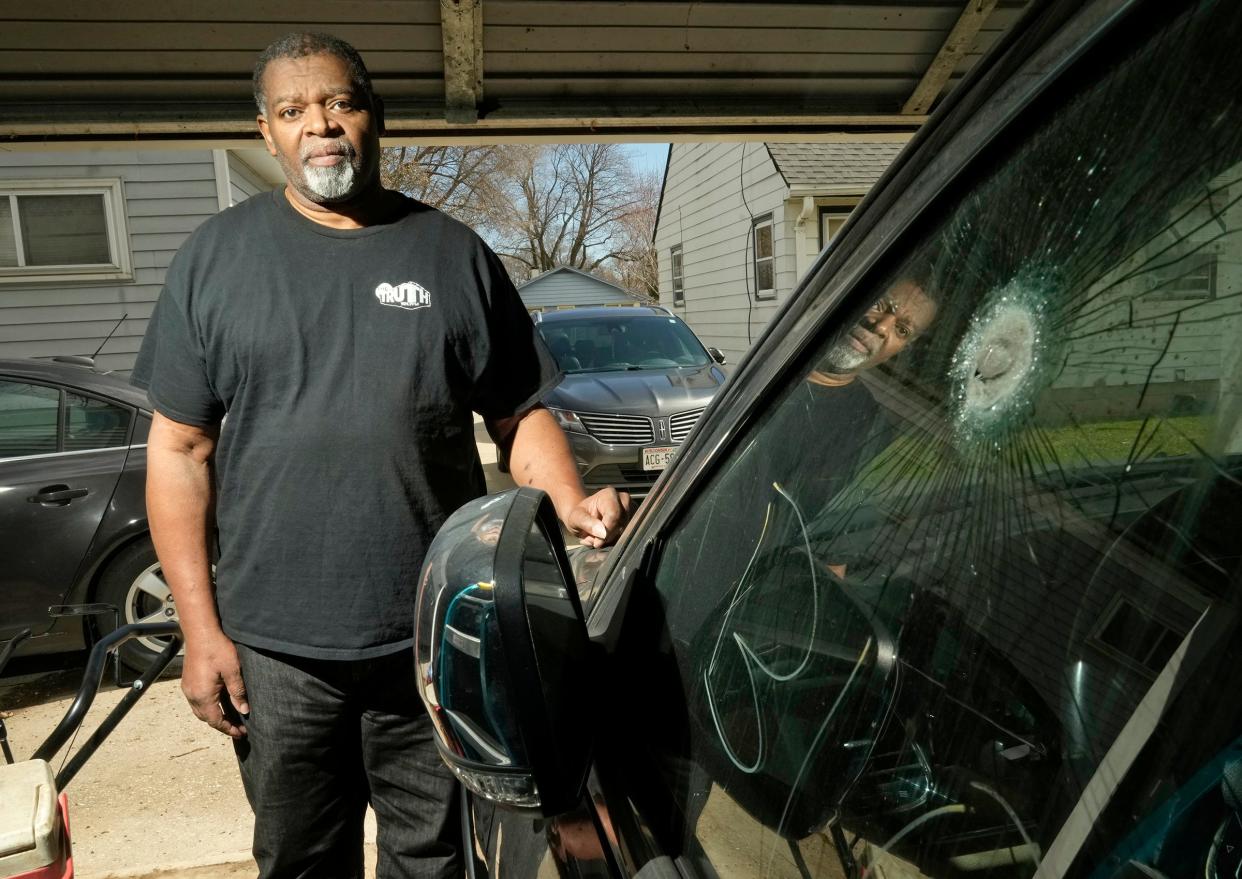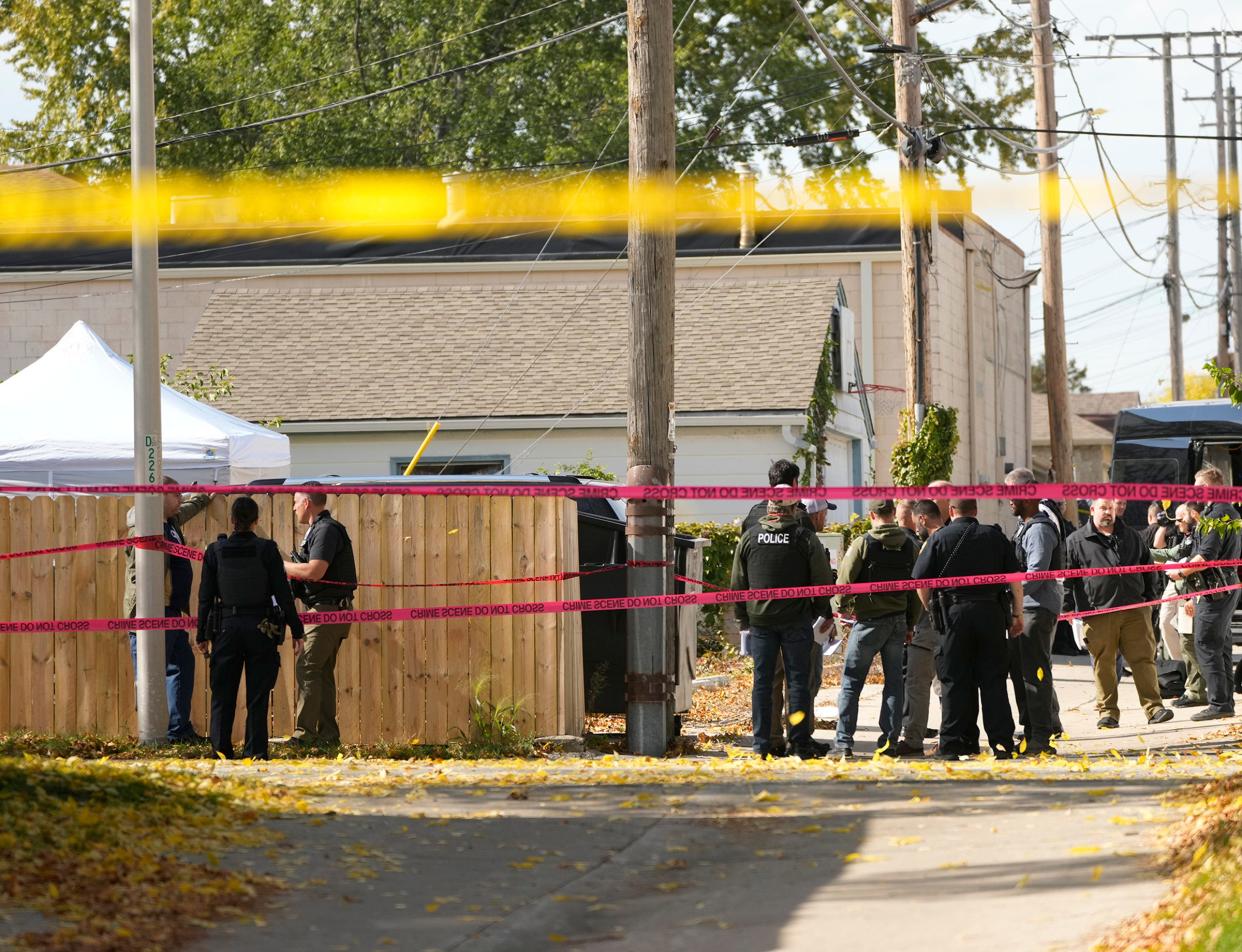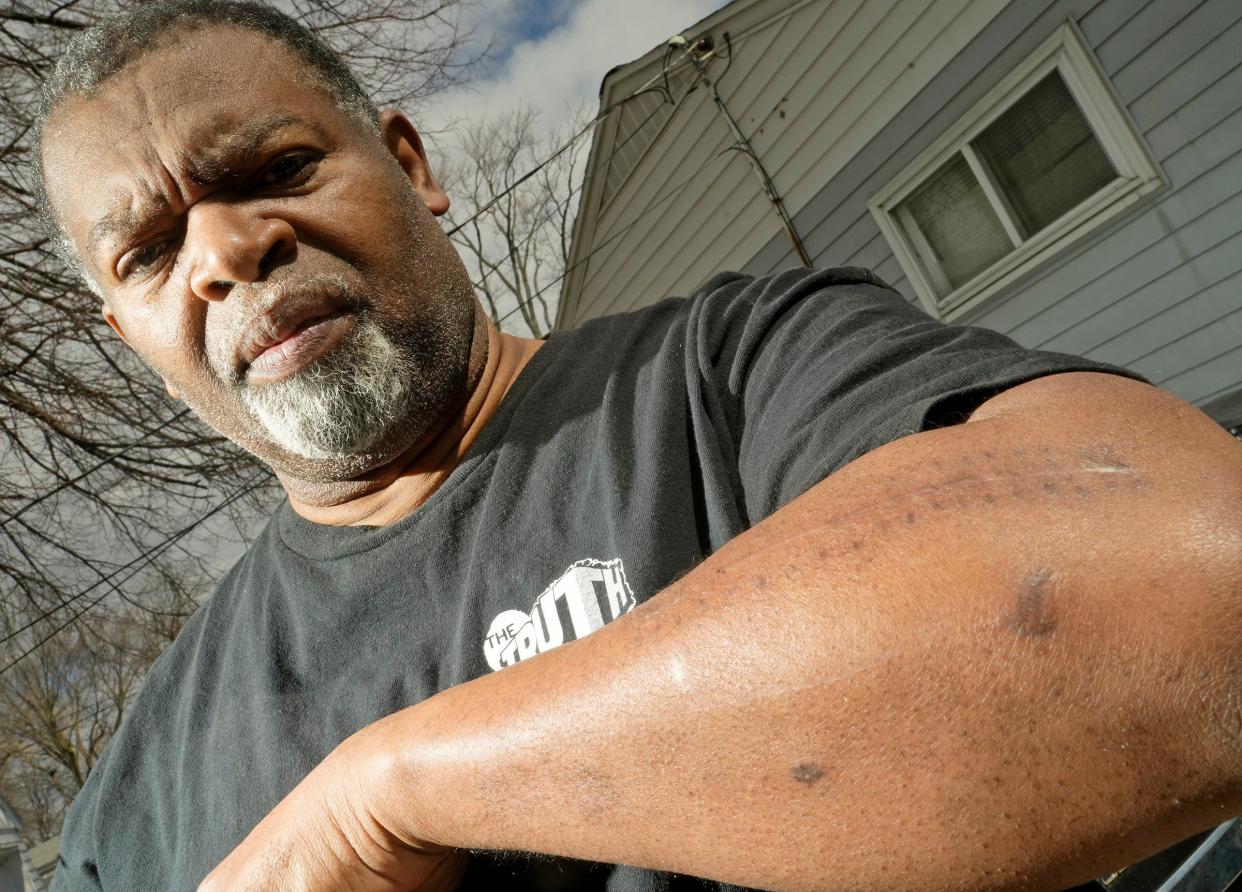He was shot at during a carjacking, a growing crime in Milwaukee as car thefts decline.

It was past 2 a.m. on a Monday last fall, and Kevin Simmons, a volunteer minister driving for Uber, needed to finish two more rides for a monetary bonus.
So he answered the call to pick up two people on Milwaukee’s northwest side. From there, his memory is fuzzy.
What he can recall is that when he was shot in the head, he put his hand to his face in confusion.
“My face is wet,” he thought to himself.
The next thing he knew, he was on the ground as his passengers made off in the beloved green Jeep Grand Cherokee he bought years ago from his daughter when she worked at a dealership.
The jeep was found four miles away and eight hours later, abandoned in a backyard with the engine running.
“It’s like a go-cart to them,” said Simmons, a lifelong Milwaukee resident who has slowly returned to his community work since the carjacking on Oct. 9, 2023. “They could care less if they crash it. They can get out and run.”
Simmons was one of more than 450 people who were carjacked in Milwaukee in 2023, a 16% increase from the previous year.
The city has been dealing with elevated but declining levels of car theft since a surge of incidents hit a peak in 2021. As thefts continue to fade for the third year in a row, carjackings – which involve the taking of a car by threat or force, often with a weapon – have a emerged as a new issue of concern for police and violence prevention officials.
This year, car thefts still outnumber carjackings 13 to 1, but reports of carjackings are up another 8% compared to 2023, as of May 23.
Milwaukee is one of the few police agencies that track carjackings, and although it is unclear how widespread the issue is nationally, it is not the only city to report a rise the last several years.
In Chicago, Denver, Los Angeles, San Francisco and Washington, D.C., carjackings have skyrocketed between 61% and 565% since 2019, according to a January report from the Council on Criminal Justice.
The increase and the reasons behind it may vary by city. But locally, law enforcement see similarities that led to ballooning car theft here: perpetrators are motivated by joyriding, earning notoriety on social media or using taken vehicles in the commission of other crimes.
And it comes at a time when violence prevention officials are hopeful that the cracks in which many young people fell into during the pandemic, when social service outreach vanished, are narrowing.
Simmons, known as "Minister Kevin," is also part of that effort as a volunteer pastor, youth basketball referee and someone who helps families impacted by violence. He refuses to let his injuries stop him.
"Obviously there’s people that are slipping through the cracks, people that we haven’t reached,” Simmons said. “Ignoring the problem ain’t solving the problem. You have to be hands-on."
Carjackings have bumped up as car thefts continue to fall

Milwaukee is still coming down from a car theft problem that arrived in late 2020 and has since spread across the country. With thieves exploiting a security design flaw in Kia and Hyundai models, Milwaukee car thefts nearly tripled in 2021, according to FBI data.
Although car theft hasn’t returned to pre-pandemic levels, it dropped 40% from its peak in 2021 to 2023, and has continued falling in 2024.
Meanwhile, carjackings have increased 29% from 2019 to 2023, according to police data, with the biggest leap coming last year.
Most police agencies do not track carjackings.
Instead, carjackings are often lumped in with general armed robbery reports, making it impossible to understand the full, nationwide scope of the issue, according to Alex Piquero, a professor of sociology and criminology at the University of Miami.
"We have no clue how many carjackings there are," he said.
There are a range of theories from police and criminologists for the fluctuations.
Early in the pandemic, many young people were not occupied with school or work. Peer pressure and the lure of notoriety on social media could push them to take risks. As communities take better precautions to prevent car theft, some may see carjackings as an alternative.
Sometimes, there’s an escalating chain of events, according to Inspector Paul Lough, the commander of Milwaukee police’s Criminal Investigation Bureau. Perpetrators will steal a car and use it to jack another. Those cars may then be used in shootings.
“The vast amount of these carjacked vehicles seem to be used as a nexus to commit other crimes,” Lough said.
But youth who may be involved in carjackings “absolutely have significant backgrounds in trauma, previous existing economic challenges and education, absolutely, is a challenge, whether or not they’re going to school,” according to Kelly Pethke, an administrator for Milwaukee County’s Department of Health and Human Services.
The pandemic only made those conditions worse, according to Pethke and David Muhammad, the deputy director of Milwaukee County’s Department of Health and Human Services.
Both said a return to in-person programming and bolstered intervention services for at-risk youth have lowered offenses among that age group.
Muhammad said the area’s youth detention center population this spring was down to “numbers we haven’t seen since the pandemic.”
“Prevention and intervention is complementary to enforcement,” Muhammad said. “It’s not either-or, it’s both-and. And when they work in concert together, we can see decreases that improve public safety and keep young people's options and possibilities open so that a bad decision doesn’t mean an end of opportunity.”
'You can't just complain and do nothing'

Lough said carjackers don’t appear to target any particular demographic or vehicle. But he said many victims are drivers delivering food, packages or passengers – like Simmons.
Prior to the shooting, Simmons, 59, worked in the construction industry. He pivoted to Uber as he navigated health issues with his leg.
He has volunteered as an assistant pastor at Miracle Temple Apostolic Church, 9235 W. Capitol Drive, worked with families impacted by violence, volunteered in youth athletics and was part of the activist group that marched from Milwaukee to Washington, D.C., in 2020 over racial inequity and police brutality.
He is known by some as “Minister Kevin,” and makes regular appearances on The Tory Lowe Show, on 101.7 The Truth. He said the standard of living disparities between Black families and the rest of heavily segregated Milwaukee motivates his work ethic.
“Milwaukee is a tale of two cities,” he said. “You can’t just complain and do nothing.”
According to law enforcement, which cited Uber records and surveillance video, Simmons drove two people more than three miles across the city’s northwest side the morning of Oct. 9, 2023. After coming to the destination, three gunshots sounded from inside the Jeep. Two passengers initially ran from the car, then returned and drove off with Simmons on the ground.
The 15-year-old charged in the incident has pleaded not guilty. A trial is scheduled in June.
Simmons said it is a “miracle” he survived, but he is still figuring out a range of challenges. He suffered gunshot wounds to his head, abdomen and arm. He gets less than five hours of sleep a night. He has lost strength in both hands. Part of his jaw is numb. He can feel all 17 screws in his arm when spreading jelly on toast.
He also lost hearing in one ear, throwing off his equilibrium. That’s made his community work especially difficult. He struggles to hear anything in a crowded room. He has difficulty walking. He can’t drive himself places, and will not set foot in an Uber.
But to help Milwaukee climb out of its pandemic-influenced challenges, he insists on refereeing basketball games this summer and talking to youth about making smart choices.
"God didn’t save my life just to be sitting in this chair," he said. "He saved my life for a reason and I have to honor that reasons.”
Contact Elliot Hughes at elliot.hughes@jrn.com or 414-704-8958. Follow him on Twitter @elliothughes12.
This article originally appeared on Milwaukee Journal Sentinel: Carjackings increase as car thefts decline in Milwaukee
